Call it the aid wars.
The Trump administration is accusing President Nicolas Maduro of starving Venezuelans by blocking tons of American-supplied humanitarian aid stored next door in Colombia.
Click to Gallery
As tensions in Venezuela mount ahead of a Saturday showdown over humanitarian aid, both sides are digging in, highlighting how the South American nation's crisis has become the latest fault line in a battle for global influence by the former Cold War adversaries.
Russian state news agencies said Wednesday that a Russian shipment of medicine and medical equipment had arrived in Venezuela. The reports did not give the size of the shipment or say what it contained, though they cited a diplomatic source as saying the delivery was made under the aegis of the World Health Organization.
Still, he said the two global powers were on a collision course in Venezuela, making it harder to negotiate a de-escalation of tensions.
The Kremlin has sharply criticized the plan as reckless, accusing Guaido of seeking a pretext to call for a U.S. military intervention.
"This is undoubtedly a direct violation of the U.N. Charter and a direct intervention into the domestic affairs of an independent country," Lavrov said. "When you listen to some representatives of the U.S. administration, it seems that diplomacy is simply ignored."
In Russia, the Kremlin sees the opposition's plan to force it across the border as a reckless pretext for ordering a foreign military intervention.
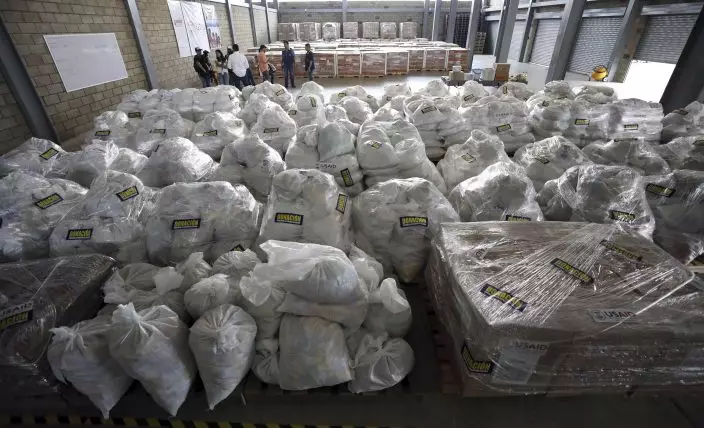
In this Tuesday, Feb. 19, 2019 photo, journalists and members of Colombia's government tour a warehouse where USAID humanitarian aid is stored near the Tienditas International Bridge on the outskirts of Cucuta, Colombia, on the border with Venezuela. Venezuela's self-proclaimed interim president Juan Guaido has been rallying international support for his challenge to Maduro and calling for international emergency aid. (AP PhotoFernando Vergara)
As tensions in Venezuela mount ahead of a Saturday showdown over humanitarian aid, both sides are digging in, highlighting how the South American nation's crisis has become the latest fault line in a battle for global influence by the former Cold War adversaries.
At stake is the future of Venezuela, a once oil-rich country gripped by hyperinflation and widespread shortages of food and medicine. Opposition leader Juan Guaido last month declared himself the country's rightful president, a claim backed by the U.S. and dozens of other nations that argue Maduro's re-election last year was fraudulent because most opposition candidates were barred from running.
Russia, long a staunch Maduro ally, has remained firmly behind the socialist leader.
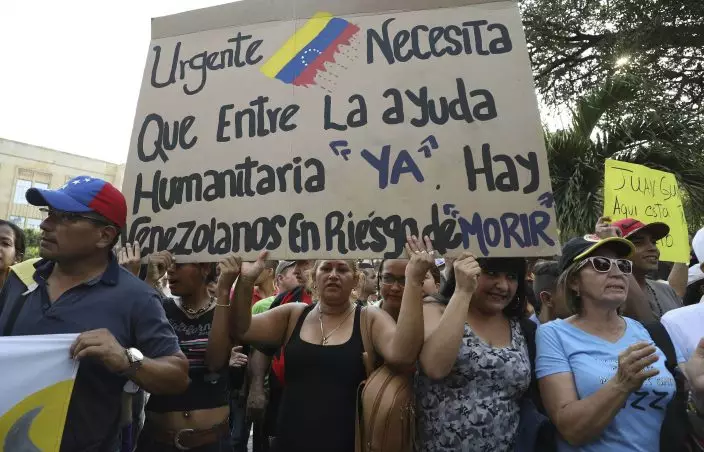
FILE - In this Feb. 12, 2019 file photo, Venezuelans living in Colombia protest the government of Venezuela's President Nicolas Maduro, and its blocking the entry of humanitarian aid, in Cucuta, Colombia, on the border with Venezuela. The sign reads in Spanish "Urgent. The entry of humanitarian help is needed now. There are Venezuelans at risk of dying." (AP PhotoFernando Vergara, File)
Russian state news agencies said Wednesday that a Russian shipment of medicine and medical equipment had arrived in Venezuela. The reports did not give the size of the shipment or say what it contained, though they cited a diplomatic source as saying the delivery was made under the aegis of the World Health Organization.
Hours earlier Maduro had said 300 tons of medicine and other aid was on its way from Russia.
Carlos Romero, an international affairs professor at the Central University of Venezuela, said that Russia's support for Maduro is more symbolic than consequential when compared to the intense pressure against the government being exerted by the U.S. in what he called "Washington's backyard."
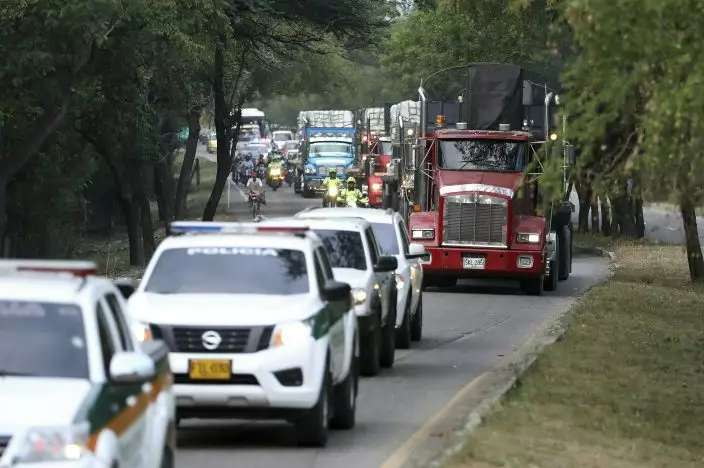
FILE - In this Feb. 16, 2019 file photo, trucks loaded with USAID humanitarian aid for Venezuela are escorted by police as they arrive at the Tienditas International Bridge in Cucuta, Colombia, on the border with Venezuela. President Nicolas Maduro is vowing to block the aid from entering Venezuela, saying the effort is part of a U.S.-led coup attempt. (AP PhotoFernando Vergara)
Still, he said the two global powers were on a collision course in Venezuela, making it harder to negotiate a de-escalation of tensions.
"The fate of Venezuela is in the hands of outsiders," said Romero, who has advised Venezuela's opposition in the past. "It's like two trains heading toward one another on the same track and every day that passes they gain speed."
Guaido has called for "caravans" of tens of thousands of Venezuelans to join forces Saturday to carry the U.S. aid from Colombia into Venezuela, despite Maduro's objections and the barricading of a key bridge linking Venezuela and the Colombian border city of Cucuta, where the aid is stored.
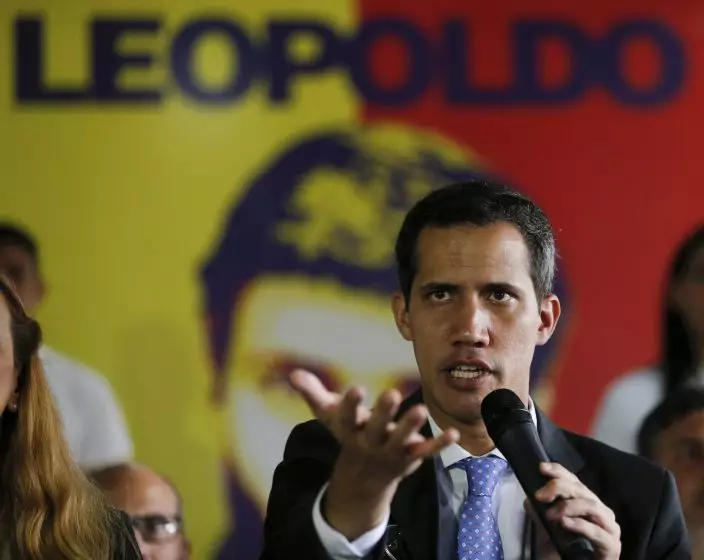
In this Monday, Feb. 18, 2019 photo, Venezuela's self-proclaimed interim president Juan Guaido speaks during a news conference, backdropped by a banner featuring opposition leader Leopoldo Lopez who is under house arrest, in Caracas, Venezuela. Guaido has said tens of thousands of Venezuelans will join forces in caravans to carry humanitarian aid from Colombia into Venezuela, despite President Nicolas Maduro’s objections and soldiers having barricaded a key bridge linking Venezuela and the Colombian border town of Cucuta. (AP PhotoFernando Llano)
The Kremlin has sharply criticized the plan as reckless, accusing Guaido of seeking a pretext to call for a U.S. military intervention.
"If the organizers really want to just deliver some kind of humanitarian aid to the needy, why not use the specialized U.N. agencies that have extensive and invaluable experience in carrying out such operations?" Foreign Ministry spokeswoman Maria Zakharova said in a statement.
Foreign Minister Sergey Lavrov reaffirmed strong criticism of Washington's policy on Venezuela, saying Wednesday that calls this week by President Donald Trump on the Venezuelan military to drop support for Maduro represent a flagrant violation of international law.

FILE - In this Feb. 14, 2019 file photo, Venezuela's President Nicolas Maduro speaks during an interview at Miraflores presidential palace in Caracas, Venezuela. Maduro said Wednesday, Feb. 20, 2019, that 300 metric tons of high-cost medicines and aid was on its way from Russia.“We’re not beggars,” said Maduro. He insisted that Venezuela would pay for the aid and that it was coordinated with the support of United Nations’ agencies. (AP PhotoAriana Cubillos, File)
"This is undoubtedly a direct violation of the U.N. Charter and a direct intervention into the domestic affairs of an independent country," Lavrov said. "When you listen to some representatives of the U.S. administration, it seems that diplomacy is simply ignored."
Lavrov said he hopes "reason will prevail" and the Venezuelan opposition will engage in talks with Maduro to resolve the crisis. He noted a strong opposition in the region to U.S. military interference.
Dmitry Rozental, a deputy head of the Russian state-funded Institute for Latin America in Moscow, said that the Kremlin will continue to offer political support for Maduro — but while carefully weighing its actions.
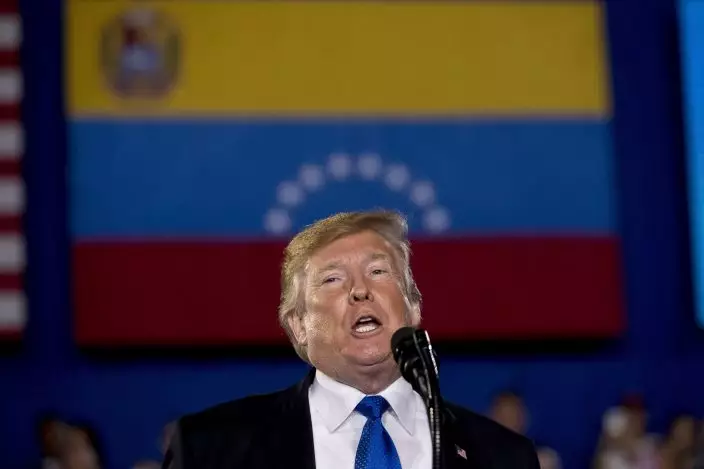
In this Monday, Feb. 18, 2019 photo, President Donald Trump speaks to a Venezuelan American community at Florida Ocean Bank Convocation Center at Florida International University in Miami, Fla., to speak out against President Nicolas Maduro's government and its socialist policies. The Trump administration is accusing Maduro of starving Venezuelans by blocking several tons of American-supplied humanitarian aid stored next door in Colombia. (AP PhotoAndrew Harnik)
"Russia will offer moral support, humanitarian aid and some economic assistance," he said. But, "the Russian leadership won't place Venezuelan interests above the interests of Russia."
He predicted that such aid will be limited in scale, noting that Russia can't afford to satisfy Venezuela's massive needs.
"Russia will offer some aid, but it will unlikely reach a great scale," Rozental said. "It could be some humanitarian aid, as well as some assistance in helping soften the impact of U.S. sanctions."
He added that as part of potential assistance to Venezuela, Russia may provide the chemical thinning agent needed to process the country's heavy crude oil.
Rozental noted, however, that Russian companies and banks will be careful in their contacts with Venezuela to avoid potential U.S. sanctions. He pointed to reports that the Venezuelan state oil company PDVSA's accounts have been frozen by state-owned Gazprombank as an example of such caution.
Meanwhile, at least one aid group warned against security forces or political actors being left to decide who receives aid and where it is distributed, while acknowledging that emergency food and medicine is badly needed in Venezuela.
"It is regrettable that aid has become a pawn in the political chess match between the governments of the United States and Venezuela," Provash Budden of the global humanitarian organization Mercy Corps said.
"Aid should never be used as political bait — both the people who need it and those who risk their lives to deliver it deserve better."
PARIS (AP) — French President Emmanuel Macron warned Thursday that Europe could “die” if it fails to build its own robust defense as Russia’s war in Ukraine rages on, or if it fails to undertake major trade and economic reforms to compete with China and the U.S.
Macron urged Europeans to become more ambitious in a fast-changing world to face the challenges of war, fierce trade competition, energy scarcity, climate change and increasing authoritarianism.
In a nearly two-hour speech at Sorbonne University in Paris, Macron said that the continent is divided and “too slow and lacks ambition” at a time when the 27-member European Union needs to become a superpower, defend its own borders and speak with one voice if it wants to survive and thrive.
“Our Europe today is mortal,” Macron said. “It can die and that depends solely on our choices,” he added. He called on people to make those choices now because, “it’s today that Europe is between war and peace.”
Russia's full-scale invasion of Ukraine, now in its third year, is an existential threat and Europe isn't armed enough to defend itself when “confronted by a power like Russia that has no inhibitions, no limits,” Macron said.
‘Our ability to ensure our security is at stake," Macron said. “Russia mustn’t be allowed to win.”
Europe now has the “good fortune” of having the Biden administration’s commitment to supporting Ukraine, Macron said. But, in a year of key elections around Europe, in the U.S. and elsewhere, support may fragment or disappear entirely, he added.
“Europe must become capable of defending its interests, with its allies by our side whenever they are willing, and alone if necessary,” Macron said.
Strong armies, a European rapid intervention program and force, tanks, a missile shield and other weapons, produced in Europe, will need the support of “a joint diplomatic force that will speak with one voice and build bridges with Africa and Latin America,” the French leader said.
“Only then will Europe show that it's not a United States’ lap dog, and that it also knows how to talk to other regions of the world,” he said.
France has been a firm supporter of Ukraine in its fight against Russian aggression, and Macron has often clashed with other Western leaders as he has insisted that Europe must stand by the country at any cost. The French president alarmed European leaders by saying recently that sending Western troops into Ukraine to shore up its defenses shouldn’t be ruled out.
Referring to trade practices of China and the U.S., Macron said “the two world powers have decided not to respect the rules of global trade” by shoring up protections and subsides while Europe’s industry remains open and is stuck in overregulation.
“Let’s do the same, we are in competition,” Macron said.
“We must buy faster, we must produce more and we must buy more that is made in Europe. That is key,” Macron said.
Thursday's speech came less than two months before a pivotal European Parliament election.
Macron, an avid advocate of a united and assertive Europe, also rallied support for his centrist Renaissance party before the June 6-9 vote as far-right parties lead the moderate coalitions in the polls. He called for safeguarding democratic values as the “authoritarian model” was becoming “more popular” across the continent.
The war in Ukraine and immigration are top priorities for European Union voters, according to polls. Far-right parties have gained support by criticizing Macron’s government policies on both issues. Macron acknowledged divisions on immigration policies, including on asylum and deportation rules for those who have arrived to Europe illegally.
He emphasized the need for an effective response and Europe-wide coordination for curbing illegal immigration, closer cooperation with immigrants' countries of origin and a unified, relentless fight against human traffickers.
Macron criticized the idea of striking an agreement, as Britain as done, with countries in Africa and elsewhere to transfer immigrants there.
“This is a betrayal of our values that ultimately leads us to dependency on other counties,” Macron said.
The British government earlier this week approved a law allowing the deportation of some migrants who enter the country illegally to Rwanda.
Macron lost his majority in France’s most influential house of parliament, the National Assembly, after the 2022 election to the far-left coalition and the far-right National Rally party.
The social situation in France remains tense as Paris prepares to host the Olympic Games this summer, amid protests from teachers and police officers, and farmer demonstrations in recent weeks. The protests follow huge rallies last year against Macron’s ultimately successful proposal to increase the retirement age from 62 to 64.
Barbara Surk reported from Nice, France. Lorne Cook contributed to this report from Brussels.
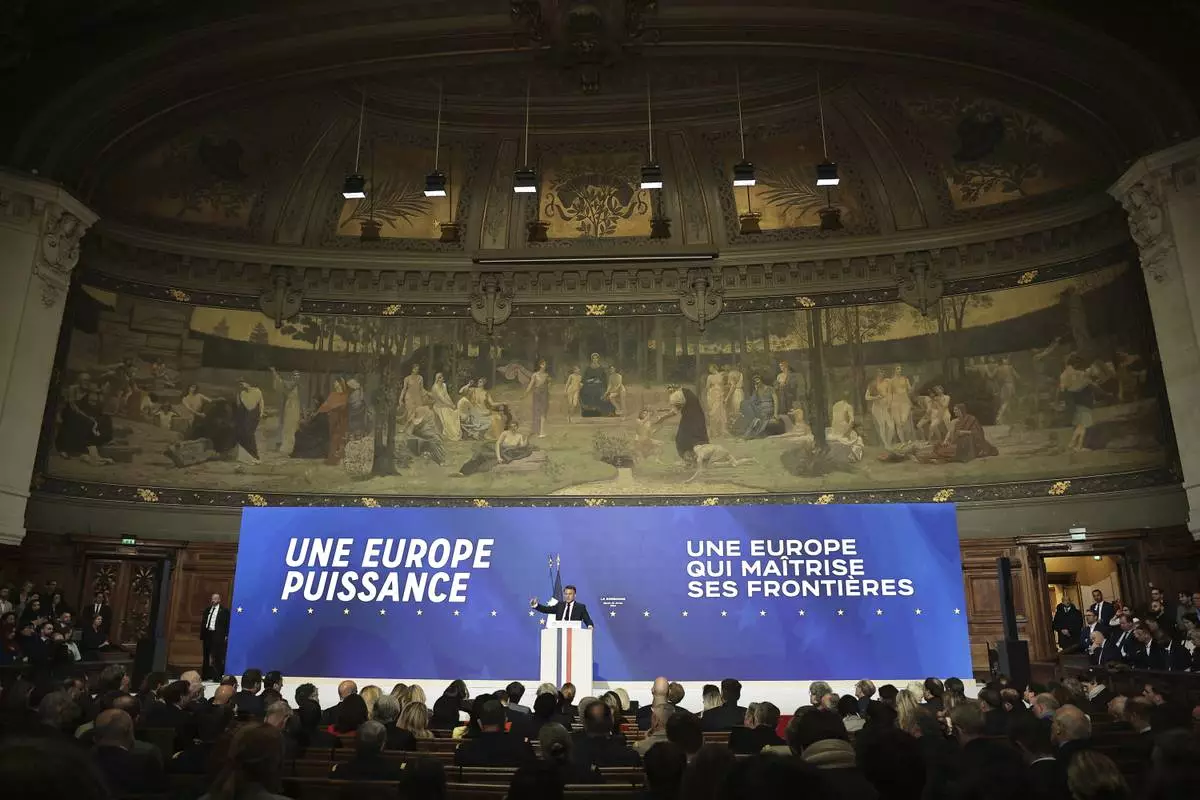
French President Emmanuel Macron delivers a speech on Europe in the amphitheater of the Sorbonne University, Thursday, April 25 in Paris. 2024. French President Emmanuel Macron will outline his vision for Europe as a more assertive global power at the backdrop of war in Ukraine, security, and economic challenges in a speech ahead of pivotal election for the European Parliament in June. (Christophe Petit Tesson, Pool via AP)
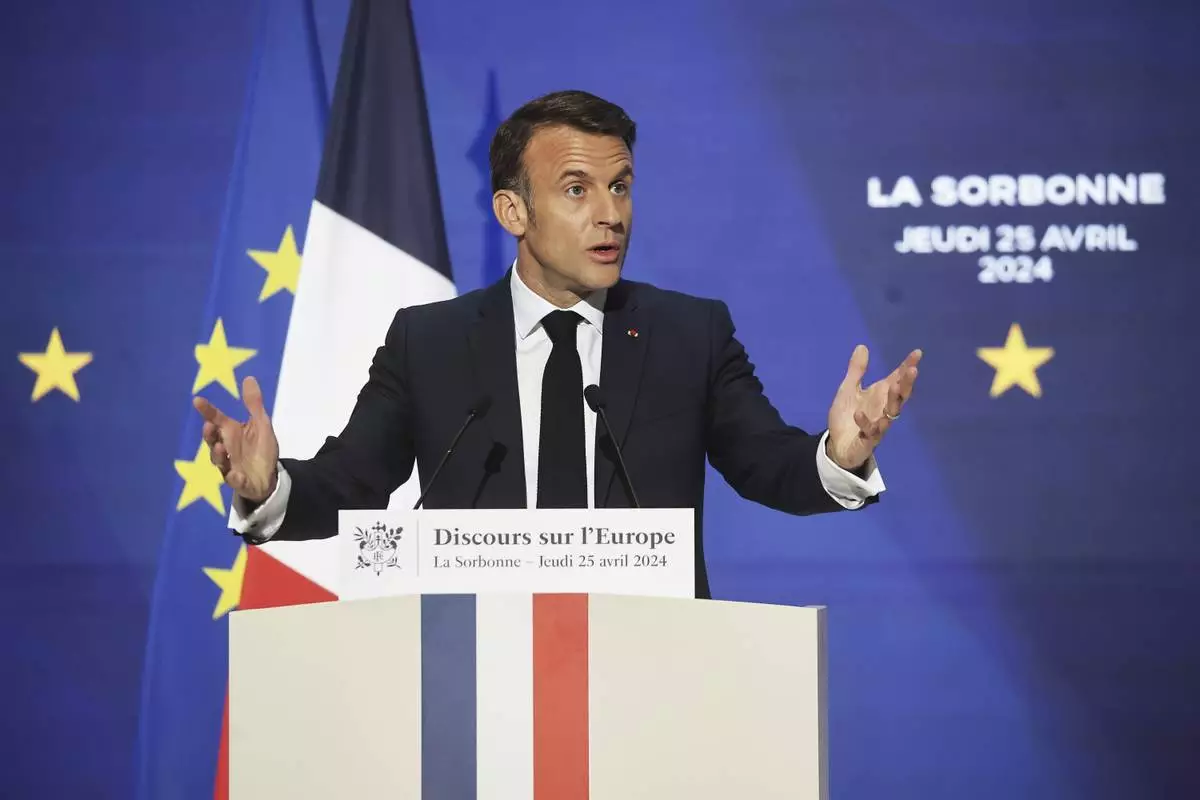
French President Emmanuel Macron delivers a speech on Europe in the amphitheater of the Sorbonne University, Thursday, April 25 in Paris. 2024. French President Emmanuel Macron will outline his vision for Europe as a more assertive global power at the backdrop of war in Ukraine, security, and economic challenges in a speech ahead of pivotal election for the European Parliament in June. (Christophe Petit Tesson, Pool via AP)
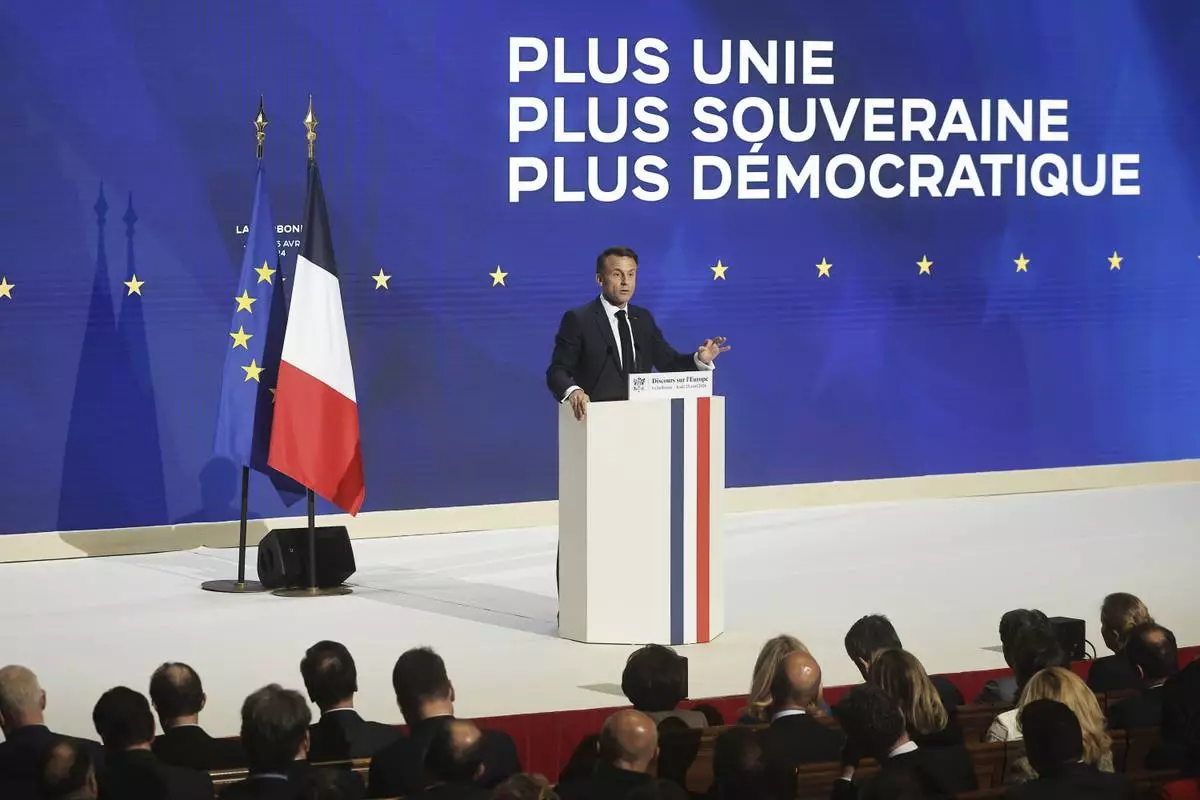
French President Emmanuel Macron delivers a speech on Europe in the amphitheater of the Sorbonne University, Thursday, April 25 in Paris. 2024. French President Emmanuel Macron will outline his vision for Europe as a more assertive global power at the backdrop of war in Ukraine, security, and economic challenges in a speech ahead of pivotal election for the European Parliament in June. (Christophe Petit Tesson, Pool via AP)
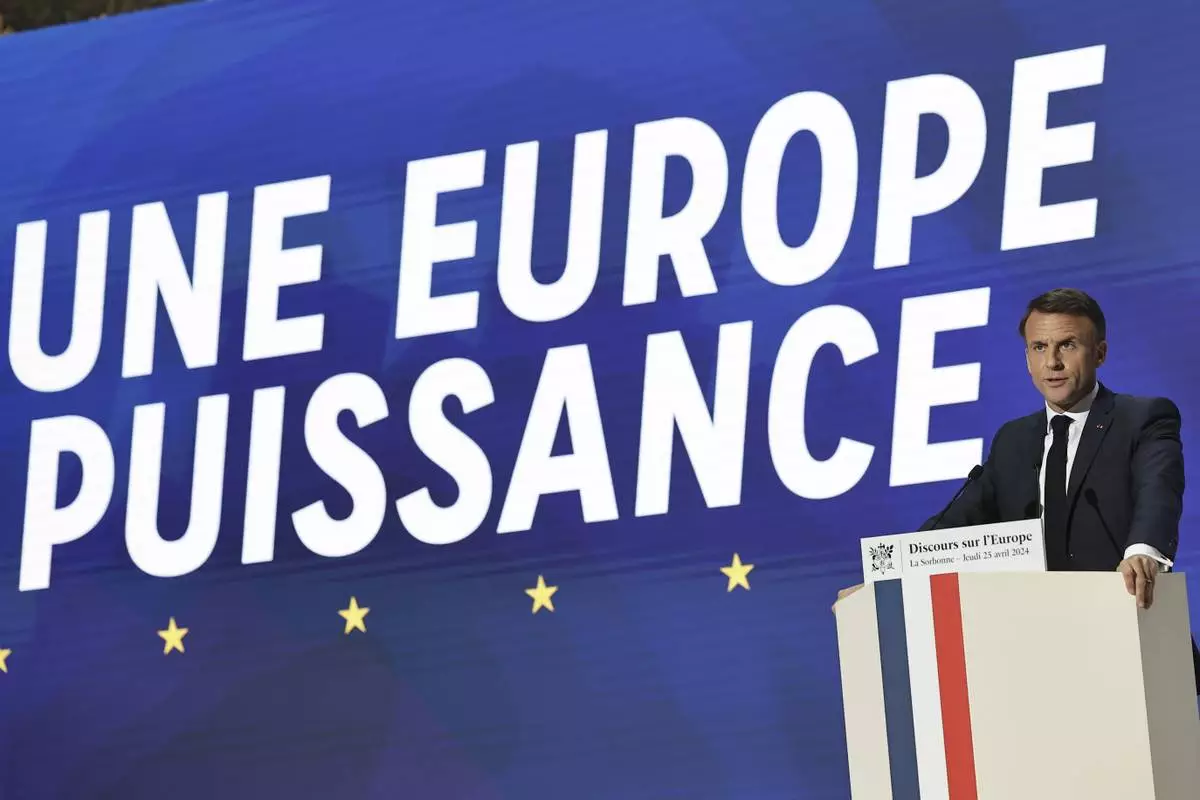
French President Emmanuel Macron delivers a speech on Europe in the amphitheater of the Sorbonne University, Thursday, April 25 in Paris. 2024. French President Emmanuel Macron will outline his vision for Europe as a more assertive global power at the backdrop of war in Ukraine, security, and economic challenges in a speech ahead of pivotal election for the European Parliament in June. (Christophe Petit Tesson, Pool via AP)
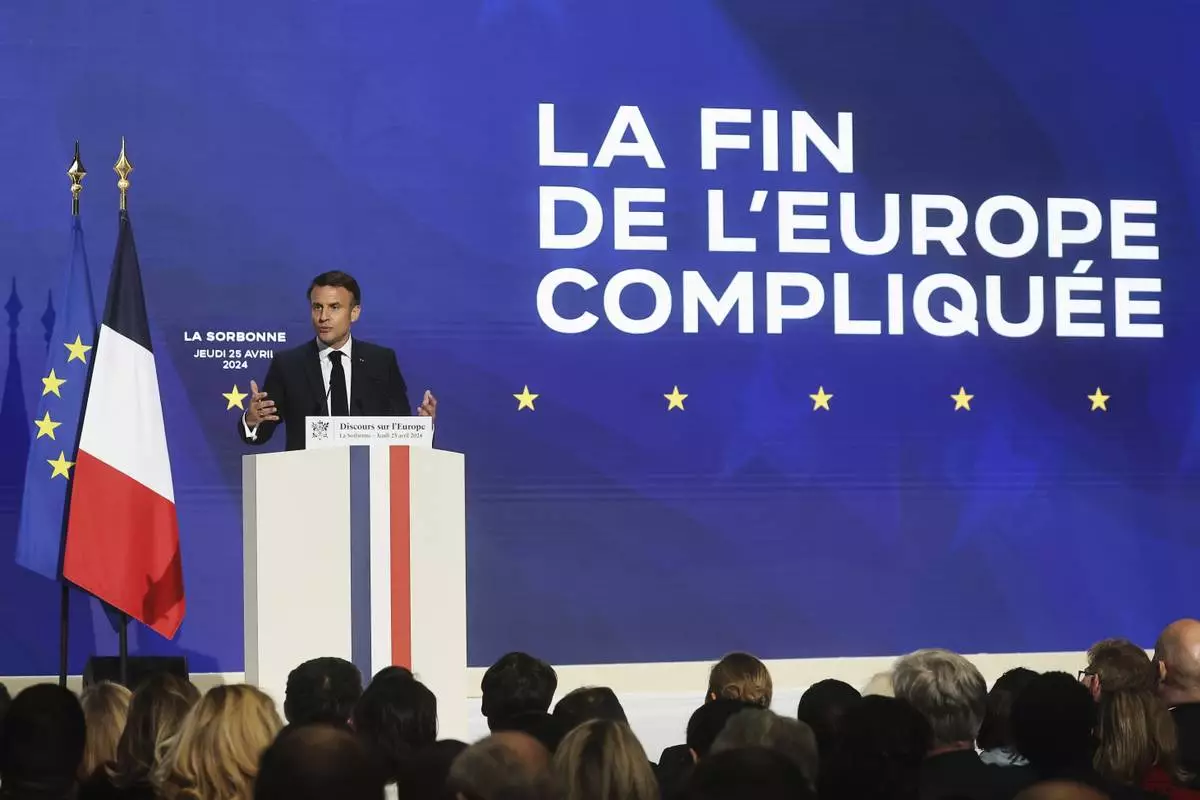
French President Emmanuel Macron delivers a speech on Europe in the amphitheater of the Sorbonne University, Thursday, April 25 in Paris. 2024. French President Emmanuel Macron will outline his vision for Europe as a more assertive global power at the backdrop of war in Ukraine, security, and economic challenges in a speech ahead of pivotal election for the European Parliament in June. (Christophe Petit Tesson, Pool via AP)
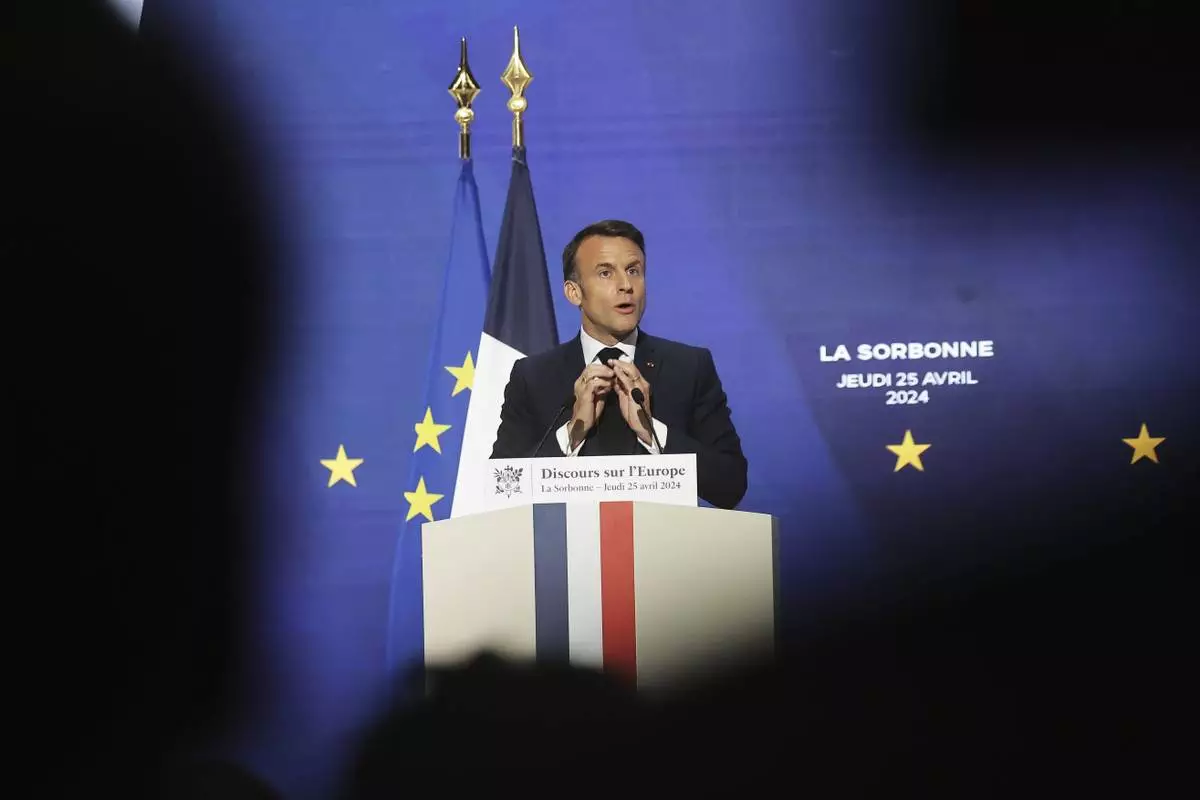
French President Emmanuel Macron delivers a speech on Europe in the amphitheater of the Sorbonne University, Thursday, April 25 in Paris. 2024. French President Emmanuel Macron will outline his vision for Europe as a more assertive global power at the backdrop of war in Ukraine, security, and economic challenges in a speech ahead of pivotal election for the European Parliament in June. (Christophe Petit Tesson, Pool via AP)
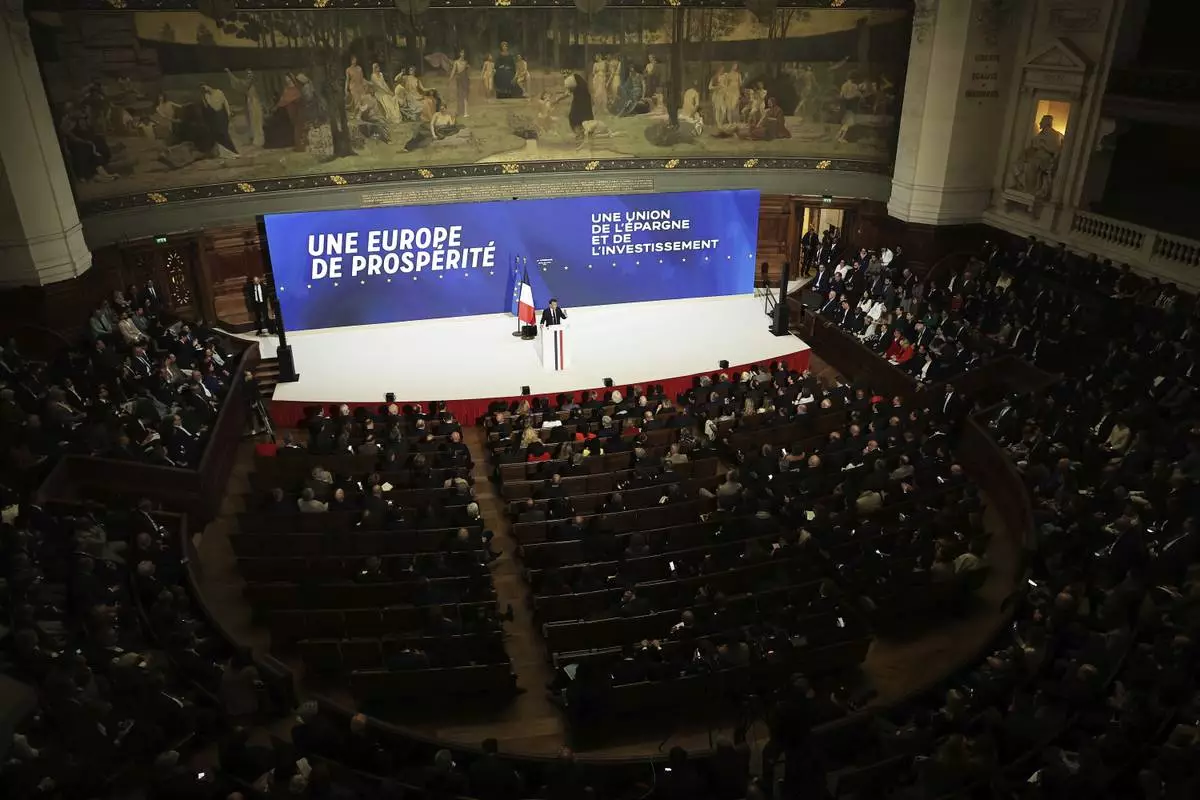
French President Emmanuel Macron delivers a speech on Europe in the amphitheater of the Sorbonne University, Thursday, April 25 in Paris. 2024. French President Emmanuel Macron will outline his vision for Europe as a more assertive global power at the backdrop of war in Ukraine, security, and economic challenges in a speech ahead of pivotal election for the European Parliament in June. (Christophe Petit Tesson, Pool via AP)
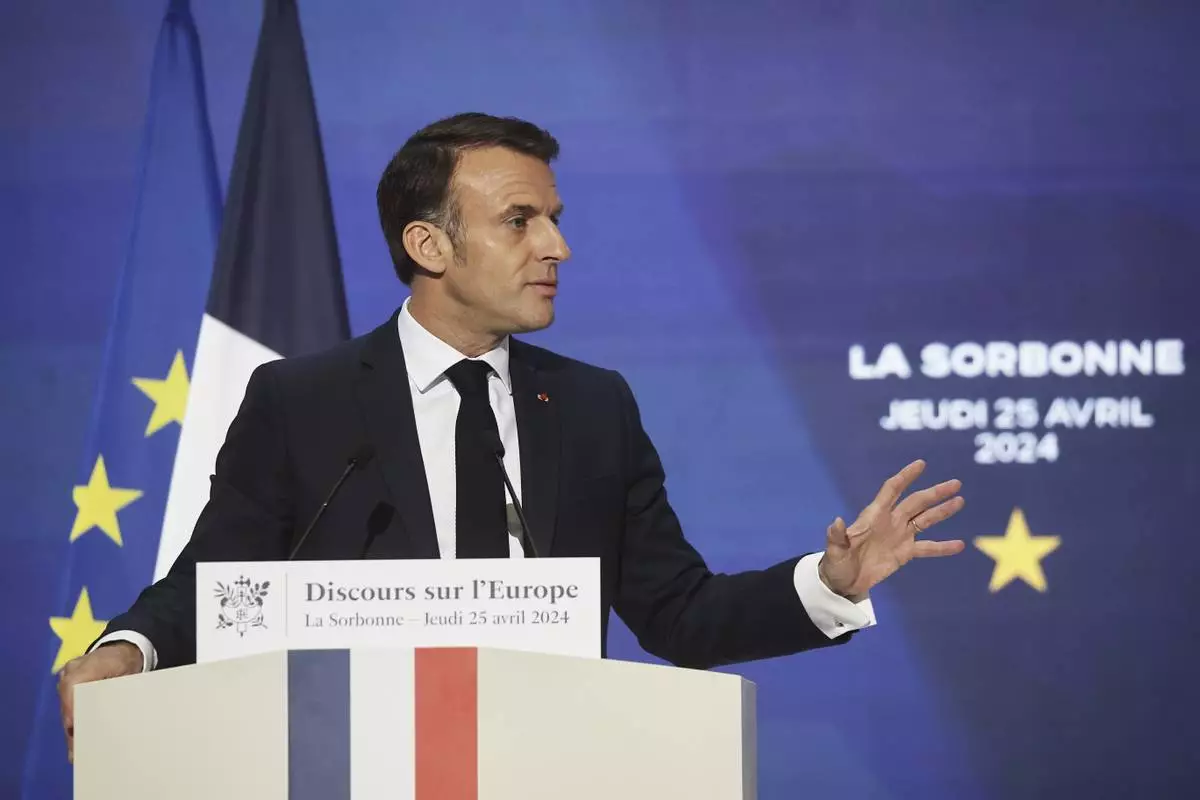
French President Emmanuel Macron delivers a speech on Europe in the amphitheater of the Sorbonne University, Thursday, April 25 in Paris. 2024. French President Emmanuel Macron will outline his vision for Europe as a more assertive global power at the backdrop of war in Ukraine, security, and economic challenges in a speech ahead of pivotal election for the European Parliament in June. (Christophe Petit Tesson, Pool via AP)
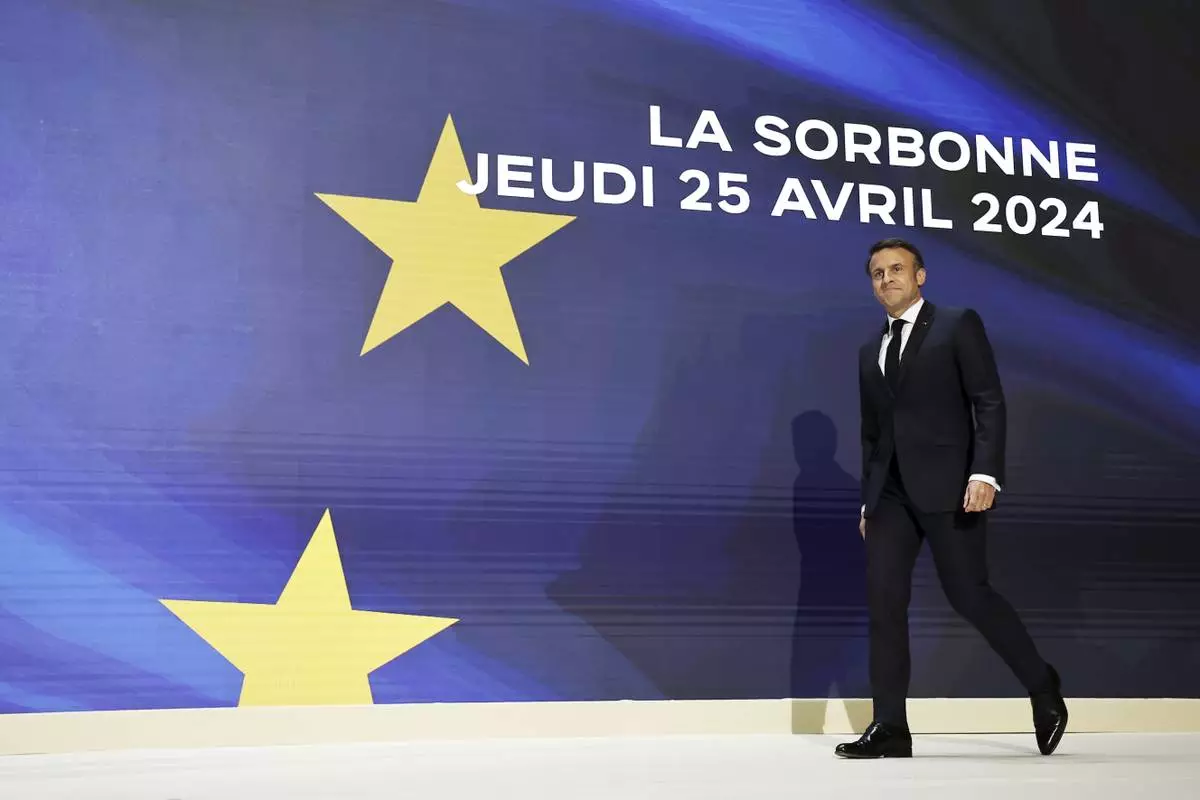
French President Emmanuel Macron arrives to deliver a speech on Europe in the amphitheater of the Sorbonne University, Thursday, April 25 in Paris. 2024. French President Emmanuel Macron will outline his vision for Europe as a more assertive global power at the backdrop of war in Ukraine, security, and economic challenges in a speech ahead of pivotal election for the European Parliament in June. (Christophe Petit Tesson, Pool via AP)
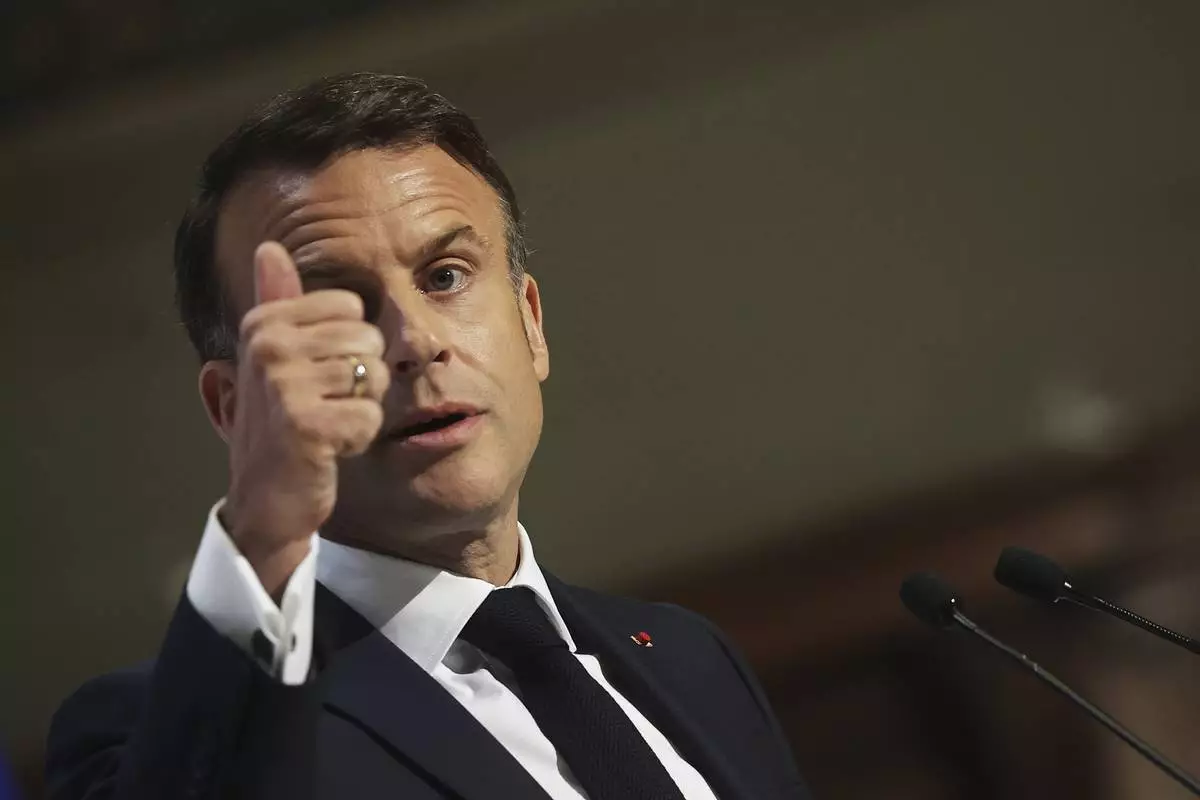
French President Emmanuel Macron delivers a speech on Europe in the amphitheater of the Sorbonne University, Thursday, April 25 in Paris. 2024. French President Emmanuel Macron will outline his vision for Europe as a more assertive global power at the backdrop of war in Ukraine, security, and economic challenges in a speech ahead of pivotal election for the European Parliament in June. (Christophe Petit Tesson, Pool via AP)
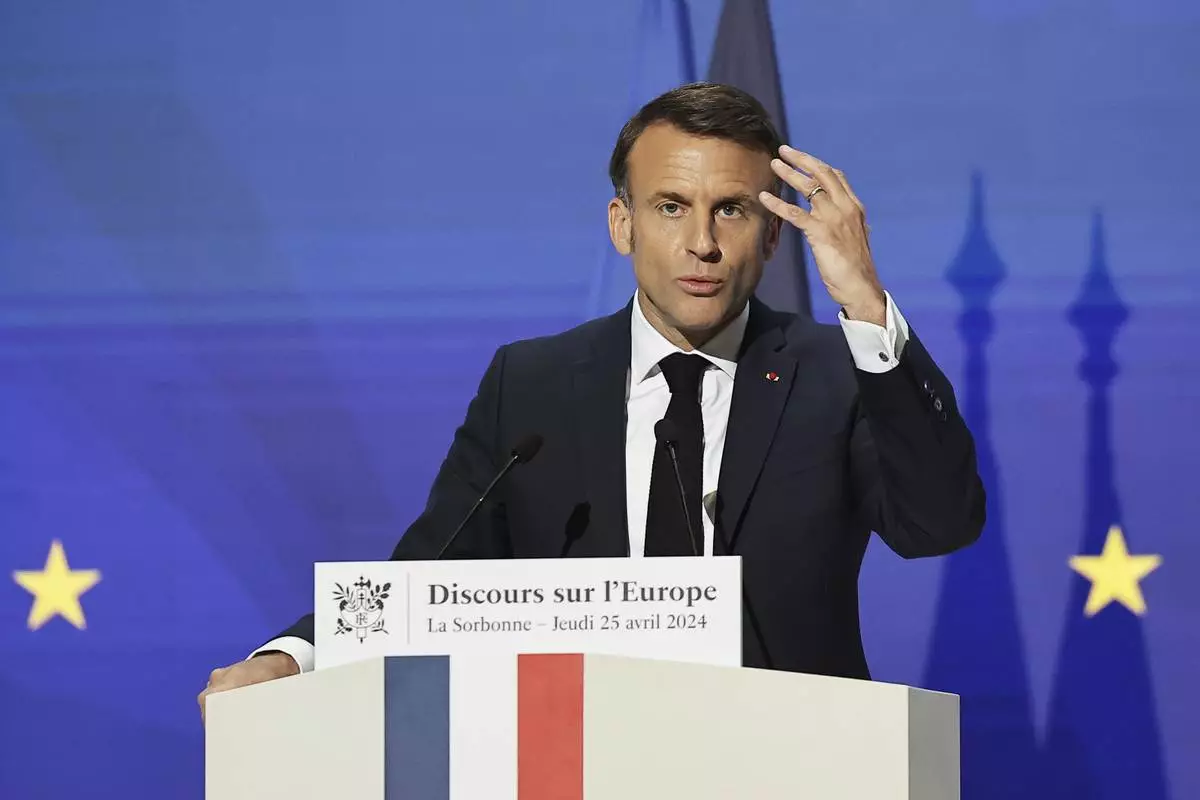
French President Emmanuel Macron delivers a speech on Europe in the amphitheater of the Sorbonne University, Thursday, April 25 in Paris. 2024. French President Emmanuel Macron will outline his vision for Europe as a more assertive global power at the backdrop of war in Ukraine, security, and economic challenges in a speech ahead of pivotal election for the European Parliament in June. (Christophe Petit Tesson, Pool via AP)
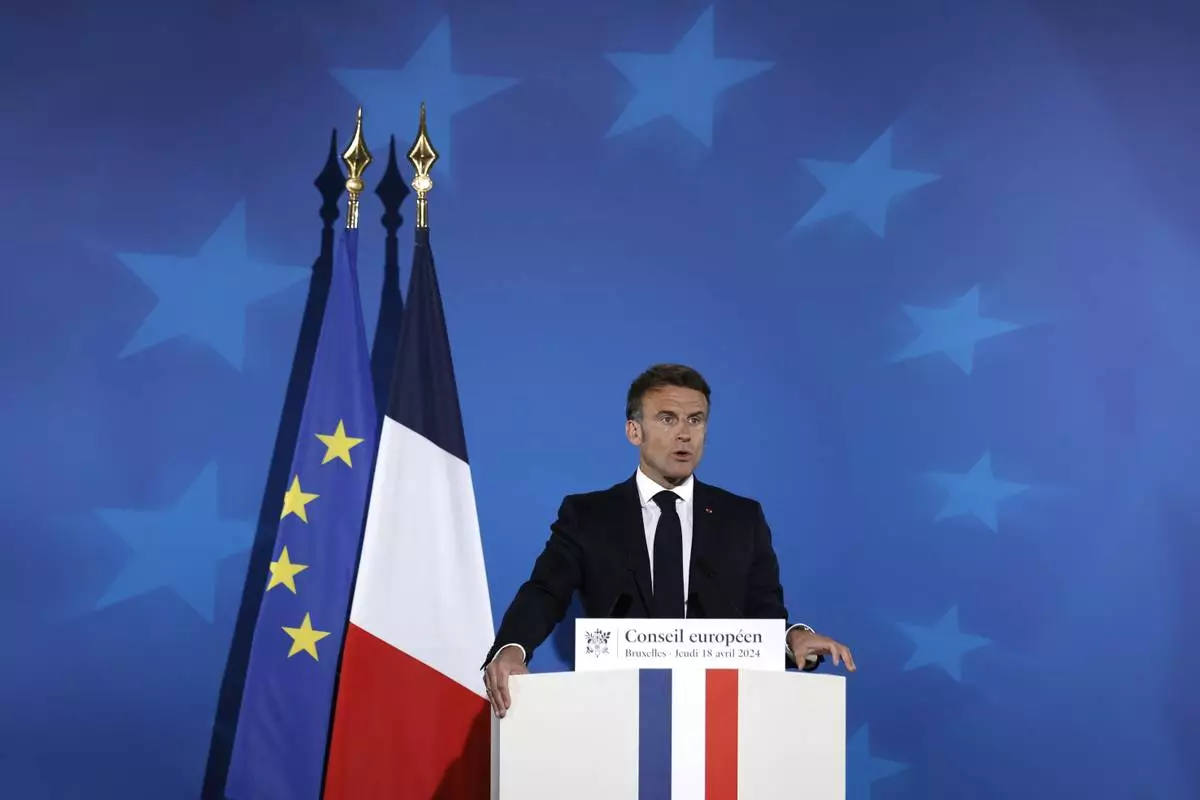
French President Emmanuel Macron speaks during a media conference at an EU summit in Brussels, Thursday, April 18, 2024. European Union leaders on Wednesday debated a new "European Competitiveness Deal" aimed at helping the 27-nation bloc close the gap with Chinese and American rivals amid fears the region's industries will otherwise be left behind for good. (AP Photo/Omar Havana)



























